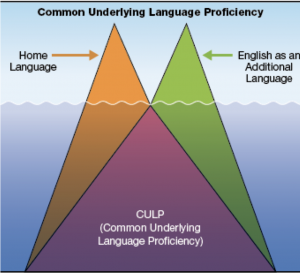2 Describe Principles for Multilingual Practice
How does Academic Language Develop
Each of your tutees brings their own journey of English language learning, and their own experiences of learning and studying in English. Jim Cummins, a major theorist and researcher on multilingualism and education, describes the ways in which academic language develops differently from everyday conversational language. Watch the video below for Cummins’ descriptions of BICS (Basic Interpersonal Communication Skills) and CALP (Cognitive Academic Language Proficiency). How do each of these develop? What are the implications for tutoring?
Common Underlying Proficiency
Many people assume that learning is most effective when the tutee spends all or most of their time in the target language (i.e. English). While it is true that a student must be committed to learning the academic language of their discipline to be successful at KPU, including the tutee’s other languages in the learning process can facilitate clearer and deeper understanding of course content. This knowledge then transfers between all languages that the tutee knows.
The Common Underlying Proficiency construct, proposed by Jim Cummins (2016, 1980), describes the way that knowledge gained in any of a person’s languages transfers to other languages that they know.

The idea of Common Underlying Proficiency highlights that we can still access any knowledge we gain in one language when we are using one of our other languages. So, if we learn accounting skills through a Mandarin-language class, we will still retain these skills when we take additional accounting courses in English.
However, it is still important to know how to communicate our knowledge in the language of our courses. If you are knowledgeable about a subject area, but do not know the vocabulary to communicate that knowledge clearly, you will be unable to show instructors or classmates what you know. Because assignments, tests, and exams are written in English, KPU students must be able to communicate their knowledge of course content accurately in English.
Complete the quiz below to test your knowledge of key multilingual education principles.
In the next section, you will interact with models that will help you apply these principles when tutoring.

